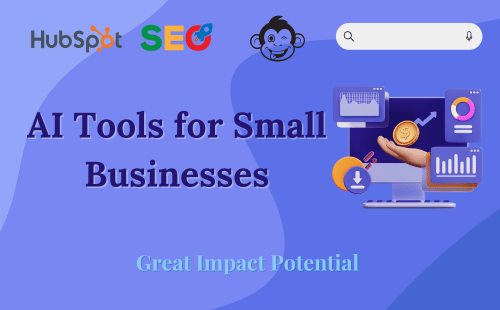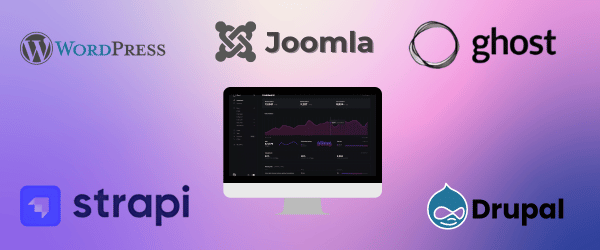
Introduction:
In today’s digital landscape, content management systems (CMSs) have become indispensable tools for businesses and individuals alike. As artificial intelligence (AI) continues to revolutionize various aspects of technology, it’s no surprise that CMS platforms are incorporating AI capabilities to enhance user experience, streamline content creation, and improve overall website performance.
For many users, especially small businesses, startups, and individual content creators, budget constraints can be a significant factor when choosing a CMS. Fortunately, several platforms offer robust free tiers that include AI-powered features, allowing users to harness the power of artificial intelligence without breaking the bank.
In this comprehensive guide, we’ll explore the top five free AI-powered content management systems available in 2024. We’ll delve into their unique features, pros and cons, and help you determine which platform best suits your needs. Whether you’re a blogger, entrepreneur, or web developer, this article will provide valuable insights to help you make an informed decision.
Let’s dive in and discover the perfect AI-enhanced CMS for your next project!
Certainly. Let’s move on to the first CMS in our list.
WordPress with AI Plugins
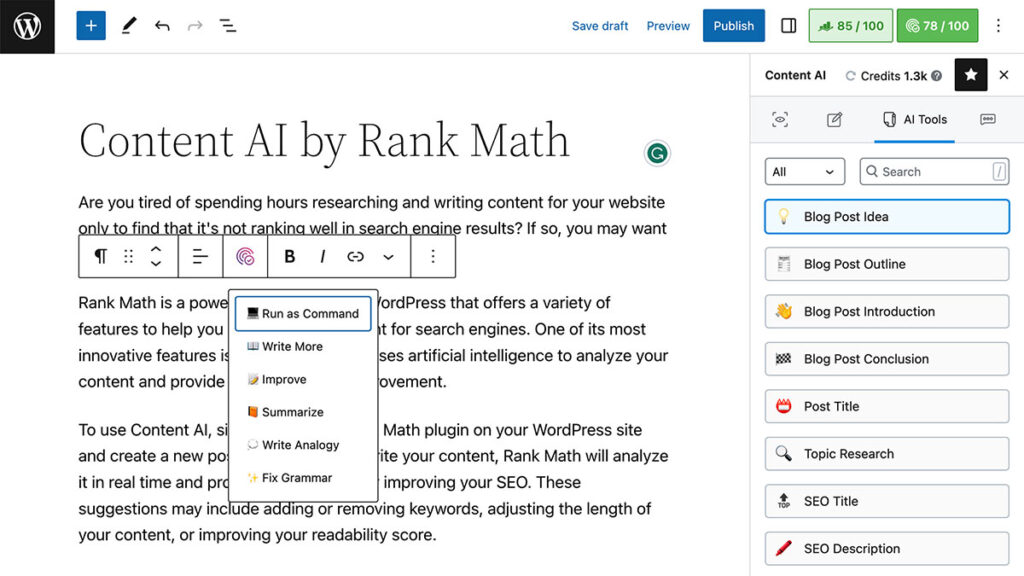
WordPress remains one of the most popular CMS platforms worldwide, and its extensive plugin ecosystem now includes numerous AI-powered tools. While WordPress itself is free and open-source, many AI plugins require paid subscriptions. However, there are still valuable free options available for users looking to enhance their WordPress site with AI capabilities.
Key Features:
- User-friendly interface suitable for beginners and experts alike
- Vast library of themes and plugins, including free AI-enhanced options
- Regular updates and strong community support
- Flexible and customizable for various types of websites
Free AI-powered plugins for WordPress:
- RankMath: SEO and AI based Content Writting
- Akismet: AI-powered spam protection for comments
- Yoast SEO: Offers AI-assisted content optimization suggestions
- MonsterInsights: Provides AI-driven insights for Google Analytics data
- TinyMCE AI: Offers AI-powered writing assistance within the WordPress editor
- WP-Chatbot: Implements a basic AI chatbot for customer support
Pros:
- Extensive documentation and tutorials available
- Large community for support and troubleshooting
- Highly extensible with thousands of free plugins and themes
- Regular updates ensure security and compatibility
Cons:
- Requires self-hosting for full functionality, which may incur costs
- Performance can be affected if too many plugins are installed
- Some advanced AI features may require paid upgrades
- Security vulnerabilities if not properly maintained
Best for:
WordPress with AI plugins is ideal for users who want a familiar, flexible platform with the option to gradually incorporate AI features. It’s particularly suitable for bloggers, small businesses, and those who appreciate a large ecosystem of extensions and customization options.
let’s move on to the second CMS in our list.
Strapi
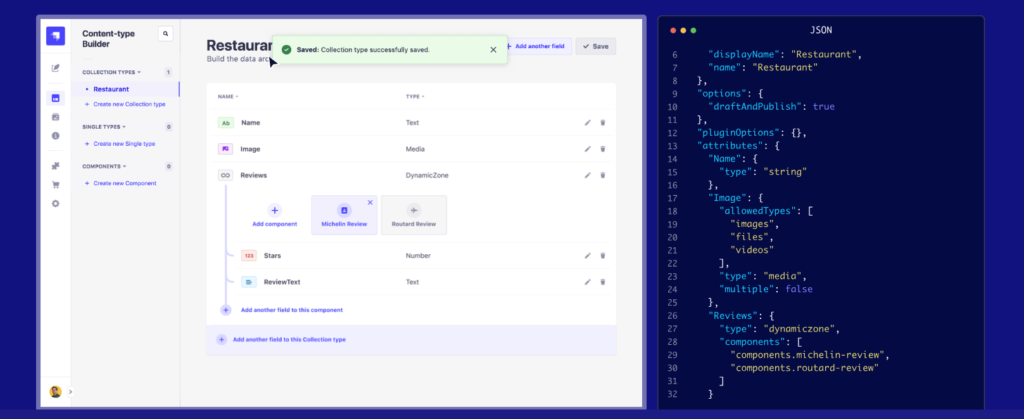
Strapi is a modern, open-source headless CMS that has gained popularity among developers for its flexibility and built-in AI features. As a headless CMS, it separates the content management backend from the frontend presentation, allowing for greater versatility in how content is displayed and distributed.
Key Features:
- Customizable API for content delivery
- Built-in AI features for content analysis and optimization
- User-friendly admin panel for content management
- Extensible plugin system
- Self-hosted solution with a free option
AI capabilities in the free version:
- AI-powered content analysis for SEO optimization
- Automated content categorization and tagging
- Smart content recommendations for internal linking
- Basic sentiment analysis for user-generated content
- AI-assisted image optimization and alt text generation
Pros:
- Highly customizable and flexible architecture
- Excellent documentation and growing community support
- RESTful API and GraphQL support out of the box
- Suitable for multi-platform content delivery (web, mobile, IoT)
- Built with security in mind, including authentication and access management
Cons:
- Steeper learning curve for non-developers
- Requires more technical expertise to set up and maintain
- Limited themes and templates compared to traditional CMSs
- May require additional development for complex AI integrations
Best for:
Strapi is an excellent choice for developers and tech-savvy users who want a flexible, API-first approach to content management with built-in AI capabilities. It’s particularly well-suited for projects that require content to be distributed across multiple platforms or for businesses looking to future-proof their content infrastructure.
Real-world example:
Consider a small e-commerce business that wants to manage product descriptions, blog posts, and customer reviews in one place while displaying this content on their website, mobile app, and potentially third-party marketplaces. Strapi’s headless architecture and AI features can help automate content optimization across all these channels, improving SEO and user experience without the need for multiple content management systems.
Let’s move on to the third CMS in our list.
Ghost with AI Integrations
Ghost is a modern, open-source publishing platform that has gained traction among bloggers, journalists, and content creators. While primarily focused on blogging, Ghost has evolved to support various content types and now offers AI integrations to enhance the content creation process.
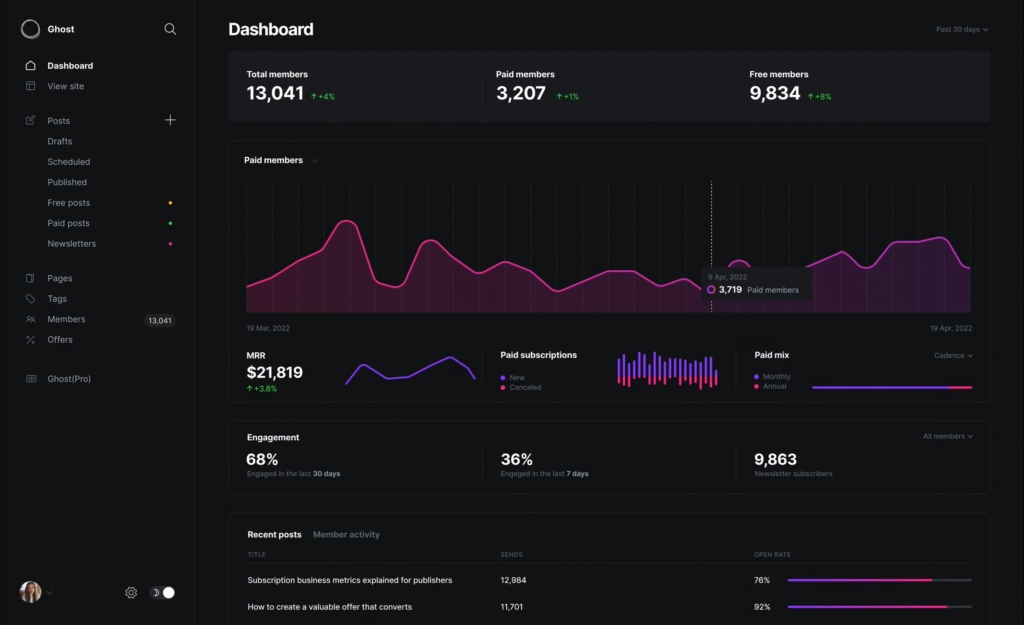
Key Features:
- Minimalist, distraction-free writing interface
- Built-in SEO tools and analytics
- Native membership and subscription features
- Headless CMS capabilities
- Free for self-hosted installations
AI integrations available for free:
- OpenAI GPT-3 integration for content generation assistance
- AI-powered content optimization suggestions
- Automated email subject line generation
- Basic sentiment analysis for comments
- AI-assisted tag and category recommendations
Pros:
- Clean, intuitive interface focused on content creation
- Excellent performance and loading speeds
- Built-in membership and newsletter functionality
- Modern tech stack (Node.js) appealing to developers
- Active community and regular updates
Cons:
- Limited theme options compared to more established CMSs
- Fewer plugins and extensions available
- Self-hosting requires technical knowledge
- Some advanced AI features may require third-party services
Best for:
Ghost is ideal for content creators, bloggers, and small publications looking for a streamlined, performance-focused platform with AI-enhanced writing tools. It’s particularly well-suited for those who prioritize a clean writing experience and want to build a loyal audience through subscriptions and newsletters.
Real-world application:
Imagine a technology journalist starting a new blog about artificial intelligence trends. Using Ghost’s free self-hosted option, they can leverage the platform’s clean interface for distraction-free writing. The integrated AI tools can help generate article ideas, optimize content for SEO, and even assist in crafting engaging email subject lines for the newsletter. As the blog grows, the built-in membership features allow for easy monetization through premium content.
Advanced tip:
For users comfortable with coding, Ghost’s API-first approach allows for custom AI integrations. For example, you could create a custom plugin that uses natural language processing to automatically generate related article suggestions or to create smart content summaries for social media sharing.
Let’s move on to our fourth CMS option.
Drupal with AI Modules
Drupal is a powerful, open-source CMS known for its flexibility and scalability. While it has a steeper learning curve compared to some other options, Drupal offers robust AI capabilities through its extensive module ecosystem, many of which are available for free.
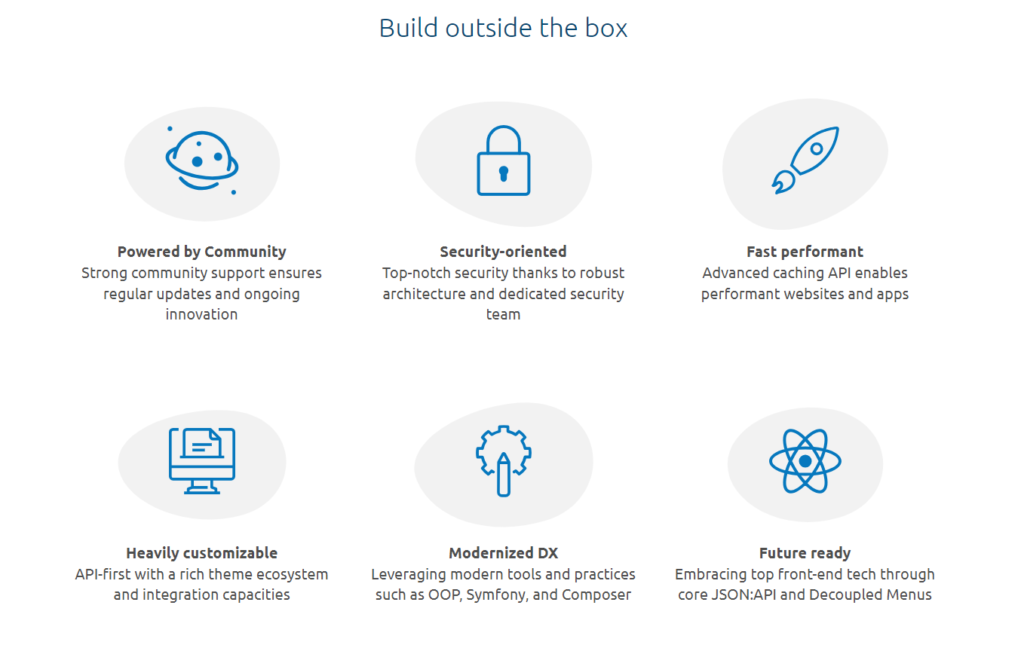
Key Features:
- Highly customizable and scalable architecture
- Strong security features out of the box
- Extensive module library, including AI-powered options
- Multi-language support
- Advanced user and content management capabilities
Free AI-powered modules for Drupal:
- Intelligent Content Tools: Provides AI-assisted content creation and optimization
- OpenAI Integration: Allows integration with OpenAI’s GPT models for various AI tasks
- Acquia Content Intelligence: Offers AI-driven content insights and recommendations (free tier available)
- Autotag: Automatically generates tags for content using natural language processing
- Smart Content: Enables personalized content delivery based on user behavior
Pros:
- Enterprise-level capabilities suitable for complex websites
- Excellent for handling large volumes of content and users
- Strong emphasis on accessibility and web standards
- Active community and regular security updates
- Flexible content modeling and taxonomy system
Cons:
- Steeper learning curve, especially for non-technical users
- Can be resource-intensive, potentially requiring more robust hosting
- Some AI modules may require additional configuration or API keys
- Fewer out-of-the-box designs compared to more consumer-focused CMSs
Best for:
Drupal with AI modules is ideal for larger organizations, educational institutions, and complex websites that require advanced content management capabilities. It’s particularly well-suited for sites that need to handle large volumes of content, multiple user roles, and complex workflows while leveraging AI for improved efficiency and user experience.
Real-world example:
Consider a university department looking to revamp its website. Using Drupal, they can create a complex structure to manage course information, faculty profiles, research publications, and student resources. The AI modules can assist in automatically categorizing research papers, generating summaries for course descriptions, and even powering a chatbot to answer common student queries. The platform’s scalability ensures it can grow with the department’s needs over time.
Advanced implementation tip:
Drupal’s Views module can be combined with AI-powered modules to create dynamic, personalized content listings. For instance, you could create a “Recommended Articles” block that uses machine learning to analyze a user’s browsing history and interests, then display tailored content suggestions, enhancing engagement and time spent on the site.
Let’s move on to our fifth and final CMS option.
Netlify CMS with AI Integrations


Netlify CMS is an open-source, Git-based content management system that offers a unique approach to website management. While it doesn’t come with built-in AI features, its flexibility and integration capabilities allow for the incorporation of various AI services, many of which can be used for free or with generous free tiers.
Key Features:
- Git-based workflow for content management
- Seamless integration with static site generators (e.g., Gatsby, Hugo, Jekyll)
- Free to use with Netlify hosting (generous free tier available)
- Customizable UI and extensible backend
- Supports serverless functions for additional functionality
AI integrations possible with free tiers:
- OpenAI GPT-3 for content generation and enhancement (limited free usage)
- Google Cloud Natural Language API for content analysis and categorization (free tier available)
- AWS Comprehend for sentiment analysis and key phrase extraction (free tier available)
- Cloudinary AI for image analysis and optimization (free tier available)
- Azure Cognitive Services for text analytics and language detection (free tier available)
Pros:
- Version control for all content changes through Git
- Fast, secure, and scalable static site hosting with Netlify
- No database required, reducing potential security vulnerabilities
- Highly customizable and extensible
- Ideal for JAMstack architecture
Cons:
- Steeper learning curve for non-technical users
- Requires familiarity with Git and static site generators
- Limited built-in features compared to traditional CMSs
- AI integrations require custom development
Best for:
Netlify CMS is ideal for developers and technical teams who prioritize performance, security, and flexibility in their content management solution. It’s particularly well-suited for projects that benefit from version-controlled content, such as documentation sites, technical blogs, or marketing websites for software products.
Real-world application:
Imagine a small software company developing a documentation site for their API. Using Netlify CMS with a static site generator like Gatsby, they can create a blazing-fast website with version-controlled documentation. By integrating OpenAI’s GPT-3, they can implement features like AI-assisted code example generation or automatic summarization of complex technical concepts. The Google Cloud Natural Language API could be used to automatically categorize and tag new documentation entries, improving searchability and navigation.
Advanced implementation tip:
Leverage Netlify’s serverless functions to create a custom AI-powered editorial assistant. For example, you could build a function that uses multiple AI services in tandem: use GPT-3 to generate content ideas or expand on bullet points, then pass the generated content through AWS Comprehend for readability analysis and key phrase extraction. This could significantly streamline the content creation process while maintaining full control over the AI integration.
Choosing the Right AI-Powered CMS for Your Needs
As we’ve explored in this guide, the landscape of AI-enhanced content management systems offers a diverse range of options for users seeking powerful, free solutions. Each of the five CMSs we’ve discussed – WordPress, Strapi, Ghost, Drupal, and Netlify CMS – brings its own unique strengths and AI capabilities to the table.
Key Takeaways:
- WordPress remains a versatile option with a vast ecosystem of AI plugins, suitable for users of all skill levels.
- Strapi offers a modern, headless approach with built-in AI features, ideal for developers seeking flexibility.
- Ghost provides a streamlined, performance-focused platform with AI integrations, perfect for content creators and bloggers.
- Drupal delivers enterprise-level capabilities with powerful AI modules, suited for complex, large-scale websites.
- Netlify CMS offers a unique Git-based workflow with the potential for custom AI integrations, ideal for developer-centric teams.
When choosing the right CMS for your project, consider the following factors:
- Technical expertise: Some platforms, like WordPress and Ghost, are more accessible to non-technical users, while others like Strapi and Netlify CMS require more development knowledge.
- Scalability needs: If you anticipate significant growth, platforms like Drupal or headless options like Strapi may be more suitable.
- Content types: Consider whether you need a specialized platform for blogging (Ghost) or a more versatile system for various content types (WordPress, Drupal).
- AI requirements: Evaluate which AI features are most important for your project and how easily they can be integrated or extended in each CMS.
- Community and support: Larger communities, as found with WordPress and Drupal, can be invaluable for troubleshooting and extending functionality.
Remember, while these CMSs offer free tiers or self-hosted options, some costs may still be involved, such as hosting fees or premium AI service subscriptions for more advanced features. Always consider the total cost of ownership when making your decision.
The future of content management is undoubtedly intertwined with artificial intelligence. By choosing a CMS that embraces AI capabilities, you’re not just solving today’s content challenges – you’re preparing for the evolving digital landscape of tomorrow.
Comparison table:
| CMS | WordPress | Strapi | Ghost | Drupal | Netlify CMS |
|---|---|---|---|---|---|
| Type | Traditional CMS | Headless CMS | Publishing-focused CMS | Traditional CMS | Git-based CMS |
| Ease of Use | High | Medium | High | Low | Medium |
| Technical Expertise Required | Low to Medium | Medium to High | Low to Medium | High | High |
| Built-in AI Features | Limited | Yes | Limited | Limited | No |
| AI Plugin/Integration Availability | High | Medium | Medium | High | High (custom) |
| Customizability | High | Very High | Medium | Very High | Very High |
| Scalability | Medium | High | Medium | Very High | High |
| Performance | Medium | High | Very High | Medium | Very High |
| Security | Medium | High | High | Very High | High |
| Community Support | Very Large | Growing | Medium | Large | Medium |
| Multi-language Support | Yes (with plugins) | Yes | Limited | Yes | Yes (customizable) |
| E-commerce Capabilities | Yes (with plugins) | Yes (via API) | Limited | Yes (with modules) | Yes (via integrations) |
| Content Versioning | Limited | Yes | Limited | Yes | Yes (Git-based) |
| Hosting Requirements | Self-hosted or managed | Self-hosted | Self-hosted or managed | Self-hosted | Netlify (free tier available) |
| Best For | General-purpose websites, blogs | API-first projects, multi-platform content | Bloggers, publishers | Large, complex websites | Developer-centric projects |
| Learning Curve | Low | Medium | Low | High | Medium to High |
| SEO Features | Strong (with plugins) | Basic | Strong | Strong (with modules) | Basic (customizable) |
| Content Modeling Flexibility | Medium | High | Medium | Very High | High |
| API Capabilities | Limited (REST API) | Strong (REST & GraphQL) | Strong (REST API) | Strong (REST) | Strong (customizable) |
We encourage you to explore these platforms hands-on, perhaps by setting up test environments for each, to get a true feel for their capabilities and how they align with your specific needs. The perfect AI-powered CMS for your project is out there, and armed with the information from this guide, you’re well-equipped to make an informed decision.
Remember, the best CMS is the one that not only meets your current requirements but also has the flexibility to grow and adapt as your needs evolve. Happy content managing!


